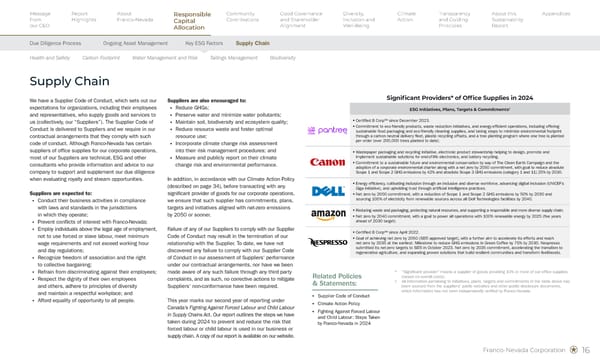Supply Chain
Franco-Nevada promotes a responsible supply chain with a strict Supplier Code of Conduct, net-zero alignment by 2050, and zero non-compliance in 2024.
Franco-Nevada Corporation 16 Supply Chain Significant Providers* of Office Supplies in 2024 ESG Initiatives, Plans, Targets & Commitments† § Certified B Corp™ since December 2023. § Commitment to eco-friendly products, waste reduction initiatives, and energy-efficient operations, including offering sustainable food packaging and eco-friendly cleaning supplies, and taking steps to minimize environmental footprint through a carbon neutral delivery fleet, plastic recycling offsets, and a tree planting program where one tree is planted per order (over 200,000 trees planted to date). § Wastepaper packaging and recycling initiative, electronic product stewardship helping to design, promote and implement sustainable solutions for end-of-life electronics, and battery recycling. § Commitment to a sustainable future and environmental conservation by way of The Clean Earth Campaign and the adoption of a corporate environmental charter along with a net zero by 2050 commitment, with goal to reduce absolute Scope 1 and Scope 2 GHG emissions by 42% and absolute Scope 3 GHG emissions (category 1 and 11) 25% by 2030. § Energy efficiency, cultivating inclusion through an inclusive and diverse workforce, advancing digital inclusion (UNICEF’s Giga initiative), and upholding trust through artificial intelligence practices. § Net zero by 2050 commitment, with a reduction of Scope 1 and Scope 2 GHG emissions by 50% by 2030 and sourcing 100% of electricity from renewable sources across all Dell Technologies facilities by 2040. § Reducing waste and packaging, protecting natural resources, and supporting a responsible and more diverse supply chain. § Net zero by 2040 commitment, with a goal to power all operations with 100% renewable energy by 2025 (five years ahead of 2030 target). § Certified B Corp™ since April 2022. § Goal of achieving net zero by 2050 (SBTi approved target), with a further aim to accelerate its efforts and reach net zero by 2035 at the earliest. Milestone to reduce GHG emissions in Green Coffee by 75% by 2030. Nespresso submitted its net-zero targets to SBTi in October 2023. Net zero by 2035 commitment, accelerating the transition to regenerative agriculture, and expanding proven solutions that build resilient communities and transform livelihoods. We have a Supplier Code of Conduct, which sets out our expectations for organizations, including their employees and representatives, who supply goods and services to us (collectively, our “Suppliers”). The Supplier Code of Conduct is delivered to Suppliers and we require in our contractual arrangements that they comply with such code of conduct. Although Franco-Nevada has certain suppliers of office supplies for our corporate operations, most of our Suppliers are technical, ESG and other consultants who provide information and advice to our company to support and supplement our due diligence when evaluating royalty and stream opportunities. Suppliers are expected to: § Conduct their business activities in compliance with laws and standards in the jurisdictions in which they operate; § Prevent conflicts of interest with Franco-Nevada; § Employ individuals above the legal age of employment, not to use forced or slave labour, meet minimum wage requirements and not exceed working hour and day regulations; § Recognize freedom of association and the right to collective bargaining; § Refrain from discriminating against their employees; § Respect the dignity of their own employees and others, adhere to principles of diversity and maintain a respectful workplace; and § Afford equality of opportunity to all people. Suppliers are also encouraged to: § Reduce GHGs; § Preserve water and minimize water pollutants; § Maintain soil, biodiversity and ecosystem quality; § Reduce resource waste and foster optimal resource use; § Incorporate climate change risk assessment into their risk management procedures; and § Measure and publicly report on their climate change risk and environmental performance. In addition, in accordance with our Climate Action Policy (described on page 34), before transacting with any significant provider of goods for our corporate operations, we ensure that such supplier has commitments, plans, targets and initiatives aligned with net-zero emissions by 2050 or sooner. Failure of any of our Suppliers to comply with our Supplier Code of Conduct may result in the termination of our relationship with the Supplier. To date, we have not discovered any failure to comply with our Supplier Code of Conduct in our assessment of Suppliers' performance under our contractual arrangements, nor have we been made aware of any such failure through any third party complaints, and as such, no corrective actions to mitigate Suppliers' non-conformance have been required. This year marks our second year of reporting under Canada’s Fighting Against Forced Labour and Child Labour in Supply Chains Act. Our report outlines the steps we have taken during 2024 to prevent and reduce the risk that forced labour or child labour is used in our business or supply chain. A copy of our report is available on our website. Related Policies & Statements: § Supplier Code of Conduct § Climate Action Policy § Fighting Against Forced Labour and Child Labour: Steps Taken by Franco-Nevada in 2024 * "Significant provider" means a supplier of goods providing 10% or more of our office supplies (based on overall costs). † All information pertaining to initiatives, plans, targets and commitments in the table above has been sourced from the suppliers' public websites and other public disclosure documents, which information has not been independently verified by Franco-Nevada. Message from our CEO Report Highlights About Franco-Nevada Community Contributions Good Governance and Shareholder Alignment Diversity, Inclusion and Well-Being Climate Action Transparency and Guiding Principles About this Sustainability Report Appendices Due Diligence Process Ongoing Asset Management Responsible Capital Allocation Key ESG Factors Health and Safety Carbon Footprint Water Management and Risk Tailings Management Biodiversity Responsible Capital Allocation Supply Chain
 Sustainability Report 2025 Page 17 Page 19
Sustainability Report 2025 Page 17 Page 19